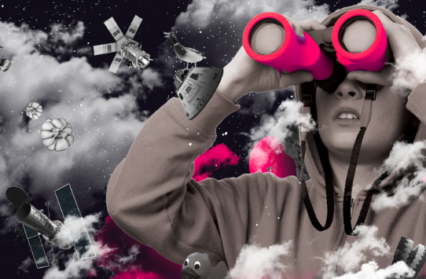The joint work of National Theatre Wales and Theatr Genedlaethol Cymru, Zoe Kramer reviews Petula, a trilingual production from Wales’ two national theatre companies which takes its audience on a surreal, intergalactic adventure.
Theatre is back, in its full-bodied, zoom-free glory, which now carries with it an inherent nostalgia of the Before Times. There’s a unique excitement of re-entering a world that has been closed off for most of recent memory. And National Theatre Wales and Theatr Genedlaethol Cymru’s joint production of Petula is truly theatrical. Petula tells the story of Pwdin, a twelve year old boy searching for his missing cousin, who has undergone a “human strike” and left for space. Split between the farcical antics of Pwdin’s parents and step-parents and the space-world to which he journeys, the story marries bizarre and whimsical humour with darker realities. It’s a story of childhood with decidedly adult undertones.
This production had the ambitious goal of presenting the script in trilingual form, with dialogue in English, Welsh and French. The execution of this was not unsuccessful — in fact, Daf James’ translation is exceptional, the interplay of the languages sounding musical. However, the trade-off is such that – for the woefully monolingual – the focus of the play is cast perpetually onto the screens to the side of the stage, and not on the actors themselves. Visually, there is a concerted effort to capture the interplay between the jovial and more serious aspects of Melquiot’s script. The stage itself is filled up like a ball pit. The initial effect of this is undeniably fun, however, as the play progresses, the balls seem to present more opportunities to hinder the actors than opportunities to be used in interesting ways. A row of TV screens descends to create the space-like realm— exciting conceptually, yet in impact the screens seem to add little to the atmosphere.
Dewi Wykes skillfully captures the adolescent mayhem of Pwdin’s psyche as well as his soft-hearted innocence. Each member of the cast delivers a strong performance, both in their roles as Pwdin’s family and in character as the various space travellers who are encountered along the way. The adult characters are cleverly portrayed as the caricatures of Pwdin’s imagination, rather than as adults in a childhood story. At times, the energy of the performance struggles to track with the meandering nature of Petula’s surreal plot. The scene shifts from Pwdin’s home to various locations in space to conversations to lo-fi hip hop interludes – the overall effect being somewhat jarring. Still, in totality it manages to maintain its offbeat rhythm, and certainly offers a welcome excursion from traditional narrative structures.
It is hard to evaluate this play without giving at least a nodding reference to the taboo of the story. The relationship between Pwdin and Petula is an incestuous one, of young cousins who fall in love. Relationships between cousins haven’t always been taboo — but for a modern audience it lands differently, and the fact of its strangeness is rarely acknowledged in the play. Still, despite its flaws, Petula offers much to enjoy. The comedy is goofy and surreal. The heart of the play is poignant and raw. It wholeheartedly embraces the most essential aspect of itself, which is its surreality.
Petula is open at the Sherman Theatre, Cardiff, until 19 March, and will then tour around Aberystwyth, Bangor, Llanelli, Milford Haven, Newport before finishing at Theatr Brycheiniog in Brecon on the 8th of April.












